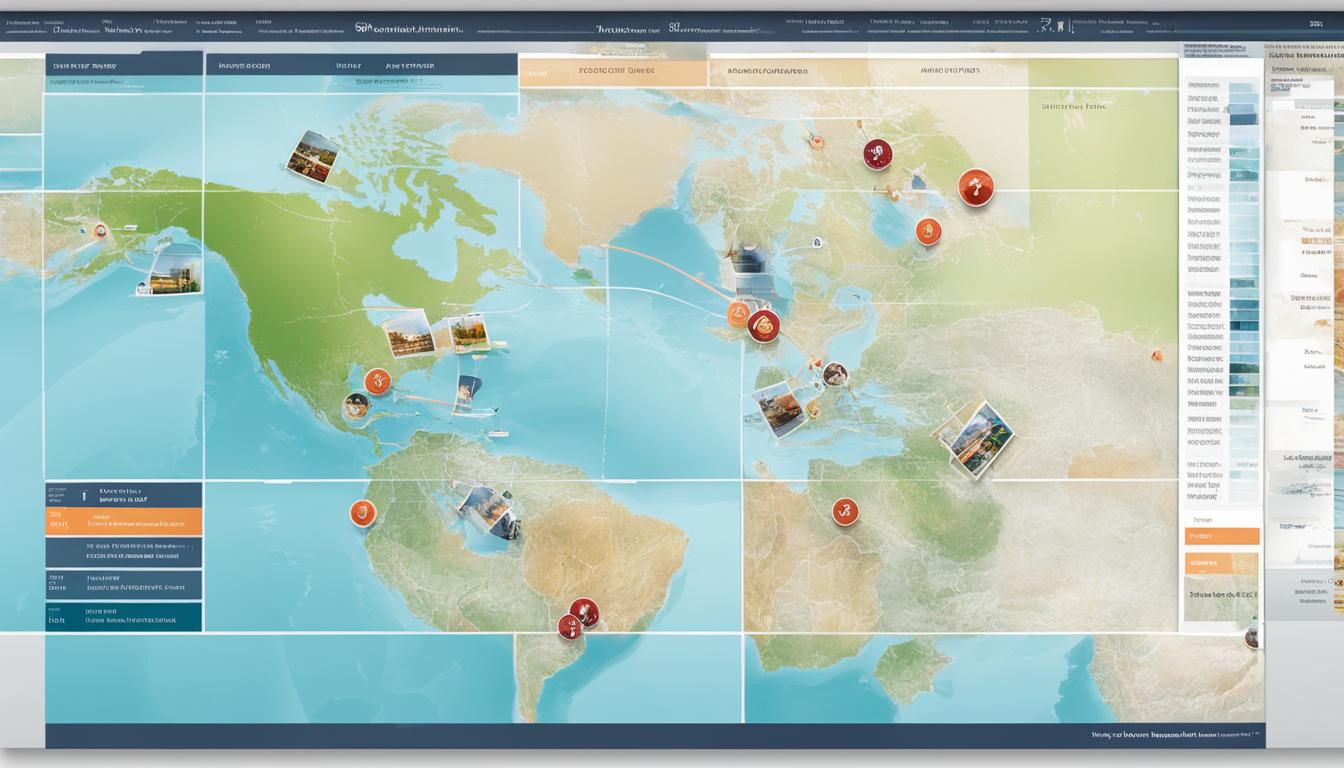When embarking on a travel nursing journey, one question that often arises is, “What is a normal travel nurse contract length?” The travel nurse contract length can vary depending on several factors. In this article, we will explore the typical travel nurse contract length, the average length of travel nursing contracts, and the factors that influence the duration of these assignments.
Key Takeaways:
- The standard contract length for travel nursing assignments is typically 13 weeks.
- Factors such as staffing needs, specific circumstances, and the nurse’s preferences can influence the travel nurse contract length of an assignment.
- Shorter assignments of 4 to 6 weeks may be available in certain situations.
- Travel nurses have the opportunity to extend their assignments if both the nurse and the hospital agree.
- Ultimately, the duration of a travel nursing assignment varies for each nurse based on their individual circumstances and goals.
Reasons for the 13-Week Standard
In the world of travel nursing assignments, the 13-week travel nurse contract length has emerged as the standard choice for several compelling reasons. This optimal timeframe offers numerous benefits to both nurses and healthcare facilities, ensuring a harmonious and efficient working relationship.
Staffing Model Flexibility
The 13-week timeframe aligns seamlessly with staffing models employed by hospitals. These models are carefully designed to match the number of nurses to occupied beds, ensuring that patient care is never compromised. By adhering to the 13-week standard, healthcare facilities can efficiently plan for the necessary staffing levels and maintain a stable workforce.
Orientation and Onboarding Periods
New nurses joining travel assignments require a certain period for orientation and onboarding. This crucial phase helps them become familiar with the facility’s policies, procedures, and systems. The 13-week duration allows for an adequate amount of time, typically ranging from 4 to 12 weeks, for nurses to settle in and excel in their roles.
Coverage for Leaves of Absence
The Family and Medical Leave Act (FMLA) provides up to 12 weeks of leave for certain qualified individuals. Opting for a 13-week travel nurse contract length ensures that travel nurses who may require such leaves of absence are still covered within the span of their assignment. This enables nurses to prioritize their personal health or family needs without worrying about jeopardizing their employment.
Housing Availability
Securing suitable housing is a significant consideration for travel nurses. The 13-week timeframe aligns well with the availability of apartment contracts, which are more commonly found for this duration. This makes the search for temporary housing easier and more convenient, providing a stable and comfortable living arrangement during the assignment.
“The 13-week travel nurse contract length strikes a balance between stability and the opportunity for travel nurses to explore different destinations.”
Overall, the 13-week travel nurse contract length has proven to be the ideal timeframe for travel nursing assignments. It offers staffing model flexibility, accommodates orientation and onboarding periods, provides coverage for leaves of absence, and ensures housing availability. This standardized of the travel nurse contract length not only benefits healthcare facilities but also allows travel nurses to maintain stability while embarking on exciting adventures in various locations.
Benefits of 13-Week Assignments
| Benefits | Description |
|---|---|
| Flexibility in staffing | The 13-week travel nurse contract length aligns with hospital staffing models, ensuring efficient workforce planning. |
| Ample orientation time | Allows new nurses to acclimate, learn facility policies, and excel in their roles. |
| Compliance with FMLA | Provides coverage for leaves of absence, protecting nurses’ employment rights. |
| Easier housing arrangements | Aligns with the availability of apartment contracts, making housing search more seamless. |
Shorter Length Assignments
While 13-week contracts are the standard in travel nursing, there is increasing flexibility when it comes to assignment durations. Travel nurses now have the option of shorter contracts ranging from 4 to 6 weeks, providing unique opportunities for those seeking more varied experiences.
Shorter travel nursing assignments offer several advantages:
- Flexibility: Shorter contracts allow travel nurses to have more control over their schedules and have the freedom to take on different assignments without a long-term commitment.
- Unique Opportunities: These assignments provide the chance to work in various healthcare settings, explore different cities, and gain diverse experiences.
- Staffing Needs: Hospitals and healthcare facilities often have specific staffing requirements that can be met with shorter assignments, ensuring they have the appropriate number of nurses based on patient demand.
- Technological Advancements: With advancements in technology, traveling nurses can easily find shorter assignments through online platforms and staffing agencies.
Shorter contracts may be ideal for travel nurses who prefer more flexibility, have specific destination preferences, or want to gain diverse experience in a shorter span of time. These assignments can be a great way to explore different cities, adapt to new work environments, and expand professional networks.
“Shorter travel nursing assignments provide a unique opportunity to work in different healthcare settings, gain diverse experiences, and explore new cities while still meeting staffing needs.” – [Real Nurse]

Rapid Response Contracts
Rapid response contracts are a great option for experienced travel nurses looking for high-intensity assignments with quick start dates and higher pay rates. These contracts are designed to fill urgent staffing needs in healthcare facilities within a short time frame, ranging from two days to two weeks.
When you take on a rapid response travel nurse assignment, you can expect a fast-paced work environment that requires you to adapt quickly to new settings and work independently with minimal orientation. This level of independence and self-sufficiency is perfect for nurses who thrive in challenging situations and enjoy taking on new responsibilities.
One of the major advantages of rapid response contracts is the higher pay rates associated with them. Due to the urgent nature of these assignments and the difficulty in finding suitable candidates at short notice, healthcare facilities are willing to offer more attractive compensation packages to attract qualified travel nurses.
If you are considering a rapid response contract, it’s important to assess your level of experience and readiness for the demands of these assignments. Strong clinical skills, adaptability, and the ability to work well under pressure are essential qualities for success in rapid response travel nursing.
Contract Extensions
As a travel nurse, you often have the opportunity to extend your contract and secure a longer assignment. Extending your contract can be beneficial for both you and the facility you’re working at. By advocating for an extension, you increase your chances of staying longer in one location, if that aligns with your personal and professional goals.
Good communication with your recruiter is crucial when it comes to securing contract renewals. Make sure to maintain open lines of communication and notify your recruiter in a timely manner about your desire for an extension. This will give them the necessary time to negotiate with the facility and increase the likelihood of getting your contract renewed.
With the ongoing nursing shortage, travel nurses are finding it easier to extend their contracts. Facilities are often willing to keep experienced and reliable travel nurses for longer periods. By consistently delivering high-quality performance and building strong relationships with the staff and patients, you increase your chances of getting an extension.
Advocating for Extensions
When advocating for a contract extension, it’s important to highlight your positive contributions to the facility. Let them know about any special skills or certifications you have acquired during your assignment that make you an asset to their team. Emphasize your willingness to continue providing excellent patient care and the value you bring to the facility.
“Extending my contract allows me to deepen my impact on patient care and the community we serve. I have developed valuable relationships with the staff and patients, and I am committed to providing continuity of care during this critical time.” – Travel Nurse
In addition to advocating for yourself, take the time to understand the facility’s needs and priorities. Be willing to be flexible with your contract terms, such as adjusting your schedule or taking on additional responsibilities if necessary. This demonstrates your commitment to the facility’s success and can strengthen your case for an extension.
Securing Contract Renewals
Securing contract renewals requires proactive communication and a collaborative approach. Keep your recruiter informed about any positive feedback you receive from the facility, as this can further support your case for an extension. Your recruiter will work on your behalf to negotiate the terms of the extension, including potential changes in pay rates or benefits.
Remember, every facility has different policies and procedures when it comes to contract renewals. Some may require formal evaluation processes, while others may simply extend the contract based on mutual agreement. Stay in close contact with your recruiter to ensure you are aware of the specific requirements and deadlines for contract extensions.
Factors Affecting Assignment Travel Nurse Contract Lengthn
The travel nurse contract length can be influenced by several factors. These include:
- Supply and demand fluctuations in the healthcare market
- Nursing shortages
- Staffing needs in hospitals
- Personal preferences and lifestyle factors
Supply and demand fluctuations can directly impact the availability and length of travel nurse assignments. When there is a higher demand for nurses in certain locations or specialties, assignments may be shorter due to increased competition. Conversely, during periods of low demand, longer assignments may be more prevalent.
Nursing shortages have been a significant contributing factor to the growth of travel nursing. As hospitals struggle to fill their staffing needs, they often turn to travel nurses to help bridge the gap. This can result in longer assignments to ensure continuity of care.
Staffing needs in hospitals can also influence the travel nurse contract length. If a hospital is in desperate need of immediate coverage, they may offer shorter-term assignments to attract nurses who are available at short notice. On the other hand, if a hospital has a longer-term staffing gap, they may be more willing to offer extended assignments.
Personal preferences and lifestyle factors also play a role in determining the length of travel nurse assignments. Some nurses may prefer shorter assignments to have more frequent opportunities to explore new locations, while others may opt for longer assignments to establish a stronger sense of community and routine.
Overall, the duration of travel nursing assignments is a dynamic combination of factors that balance supply and demand, address staffing needs, and accommodate the preferences of both healthcare facilities and travel nurses.
Travel Nurse Contract Length Wrap Up
The travel nurse contract length can vary significantly, ranging from as short as 2 weeks to as long as 26 weeks. However, the standard length for most travel nursing contracts is 13 weeks. This 13-week travel nurse contract length provides a balance of stability and flexibility for both travel nurses and healthcare facilities.
Several factors influence the travel nurse contract length, including staffing needs, personal preferences, and the availability of shorter or extended contracts. Travel nurses have the opportunity to choose assignments that align with their individual needs and goals. Some nurses may prefer shorter contracts to explore multiple destinations and gain diverse experiences, while others may prefer longer contracts for increased stability and deeper connections within a community.
Ultimately, the length of a travel nursing assignment is a personal choice that depends on individual circumstances. The flexibility in contract lengths allows nurses to tailor their assignments to fit their specific preferences and work-life balance requirements. Whether you choose a shorter or longer duration, travel nursing offers a unique opportunity to combine your passion for nursing with the adventure of exploring new places.
Learn More About Travel Nurse Basics
What is the typical travel nurse contract length?
The standard contract length for travel nursing assignments is 13 weeks. However, assignments can range from 2 to 26 weeks.
Why are 13-week contracts considered the standard for travel nursing assignments?
The 13-week travel nurse contract length has become the standard due to its flexibility and alignment with staffing models. It also accommodates orientation periods, leaves of absence, and housing availability.
Are shorter travel nursing assignments available?
Yes, shorter contracts of 4 to 6 weeks can be available, depending on staffing needs and specific situations.
What are rapid response contracts?
Rapid response contracts are high-intensity travel nursing assignments that require nurses to start within a short time frame, typically ranging from two days to two weeks.
Can travel nursing contracts be extended?
Yes, travel nurses often have the opportunity to extend their contracts based on their performance, the facility’s needs, and good communication with their recruiter.
What factors influence the travel nurse contract length?
Factors such as supply and demand fluctuations, nursing shortages, staffing needs, and personal preferences can affect the length of travel nursing assignments.
How flexible are travel nurse contract length?
Travel nursing assignments offer flexibility in contract lengths, allowing nurses to choose assignments that align with their personal and professional goals.




